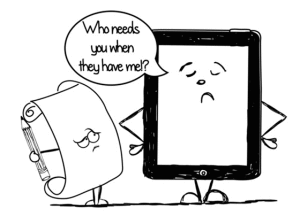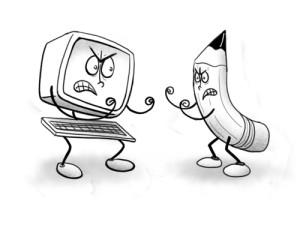
While attending a legal seminar on depositions, a speaker, (who is also a court reporter) announced that he would likely cease delivering paper transcripts within two years. He attributed this change to a desire by attorneys to “go paperless.” This sparked me to ask the question, is it really wise to go entirely paperless? Well, it turns out that science has already weighed in on the topic and demonstrated that you actually benefit from reading material on paper as opposed to a computer screen. This statement is somewhat ironic in that we are posting this article on a digital medium and we were the first court reporting firm in Louisville to offer attorneys an entirely paperless delivery option. Notwithstanding our “hypocrisy,” we will attempt to analyze the benefits of paper versus paperless and provide examples of when it is best to print your deposition transcripts.

The Advantages Of Going Paperless.
Kentuckiana Court Reporters introduced paperless transcript delivery almost a decade ago. Paperless delivery is helpful to the environment and, quite frankly, cheaper. We offer a $.25 per page discount to attorneys who do not order a paper copy. The cost of the paper and the time spent printing and binding deposition transcripts is significant. Delivery of printed transcripts is also expensive and time consuming. Paperless transcripts allow attorneys to carry thousands of pages of transcripts and exhibits on their tablet while reviewing and annotating these notes with a free transcript viewer. Electronic transcripts are more easily organized, replaced, transported, and used at trial. Heck, we have even dedicated a significant portion of our website explaining how iPads and tablets can improve your legal practice. So what is the problem? If digital is the perfect medium, why are we writing an article on paper deposition transcripts? Well, paper actually allows you to remember things better, faster, and with less stress than computer screens.
The Human Brain Is Not Wired For Reading, Let Alone Digital Reading.
Writing is a relatively recent human invention. According to Dr. Maryanne Wolf, in her book “Proust and the Squid,” we are not born with neural connections dedicated to reading. Instead, the human brain must wire other parts of its neural structure together in order to comprehend written language. The portions of the brain which are getting wired together include neural tissue dedicated to vision, spoken language, and motor coordination.
Due to the fact that the portions of the brain used for reading are actually neurons specialized in object recognition, the brain perceives letters as physical objects. When you read, your brain will create a representation of the text that is anchored to structure. For example, if you asked how to drive to downtown Louisville from Frankfort, you would recall that the Kennedy Bridge is on your right-hand side as you drive downtown. Likewise, when recalling information from books, you will recall the discussion of downtown Louisville appearing in the beginning, middle, or end of the book. You are also likely to recall whether it was on the top or the bottom of the page. Your brain visualized the text the same way it would visualize a drive home.
Paper books, like the physical terrain of Louisville, have topography. You can easily reference the beginning, middle, and end of a book. Computer screens, on the other hand, are just a seamless stream of words without reference points. Your brain simply is not wired to process information in this manner.

Reading From Paper Increases Your Comprehension.
Numerous studies have demonstrated that reading from paper, instead of a computer screen, increases your memory of what was read, increases your comprehension, and allows you to do so with less stress. If you are going to trial, it is imperative that you prep the old-fashioned way – – with paper deposition transcripts. A 2011 study by the Technion-Israel Institute of Technology showed that students who studied from paper scored 10% higher on examinations than those who studied only from computer screens. Likewise, a Swedish study of students taking the Swedish Higher Education Entrance Exam found the same results. Students who took the test from paper instead of from a computer scored higher and reported less stress than those using a computer. These studies have been documented extensively in Scientific American.
Keep Paper In Your Practice.
So what does this all mean? As a court reporter, it is actually more difficult and cumbersome for us to print a paper copy of transcripts. However, we would suggest that you nonetheless keep paper in your practice when critical portions of your case are at issue. For example, if you are preparing for trial or a major hearing, you should complete your review from paper pleadings and deposition transcripts. The science is conclusive; you will comprehend more (with less effort) by reading from paper. Does this mean you should order a paper transcript from your court reporter at the end of every deposition? Not necessarily, but you may want to print (or ask your court reporter to print) a paper copy for you when the time is appropriate. Thankfully, our well-read court reporters maintain all our deposition transcripts in perpetuity and can deliver a paper copy to you at any time. After your next great trial victory, remember to thank the court reporters who gave you the edge with some old-fashioned paper transcripts.

